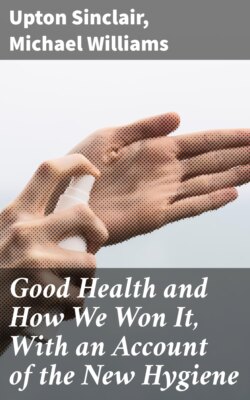Читать книгу Good Health and How We Won It, With an Account of the New Hygiene - Michael Williams - Страница 11
На сайте Литреса книга снята с продажи.
HEALTH, LIKE DISEASE, IS CATCHING
ОглавлениеTable of Contents
In actual practice it is found that the second problem is by far the more important one. Some germs we can avoid. If we boil all the water that we drink we will not be very apt to have typhoid. If we exterminate rats and mosquitoes and flies and fleas, we will not have yellow fever, or malaria, or plague. But we cannot hope to do this at present in the case of such diseases as, for instance, consumption, grippe, and influenza. If we live in a city, we take into our lungs and throat millions of the germs of these diseases every day. Therefore the one hope that is left is to keep ourselves in such a condition of health that the army of our bodies shall be able to destroy these germs. When the blood is in a healthy condition, the white cells are numerous, powerful, and active, but when the blood flows stagnantly, or when it is impoverished, then the white cells are few and the forces of disease obtain a foothold.
Healthy men can go through many epidemics with impunity. Because the Japanese army was an army of healthy men, its death rate from those diseases which usually follow in the wake of all armies was lower than the world had ever known before. Robert Ingersoll once said that if he had been God and had made the world, he would have made health “catching,” and not disease. As a matter of fact, health is catching. It abounds in the very air we breathe, in the water we drink, in the movements of every muscle and the play of every fibre and nerve of the body; it comes from and is nourished by each and every one of the bodily actions and functions; while disease is only secured by persistent transgressions of the proper way of living, and by injurious habits and customs that result in lowering the “vital resistance.”
This vital resistance is the innate power of the body to keep itself strong; its very lifeforce. This is what we mean when we say that this or that person has “a good constitution,” or has “a weak constitution.” This is the capital in the bank of each individual life, placed there by Nature at the birth of that life, and increased or diminished by each and every action of our bodies, and also of our minds. As Rokitansky, the eminent German scientist, said, “Nature heals. This is the first and greatest law of therapeutics—one which we must never forget. Nature creates and maintains, therefore she must be able to heal.”
Many of the most notable discoveries and experiments of modern science concur in demonstrating that the natural and innate healing power of the body is man’s greatest resource in combating disease and maintaining health. It is the body itself which cures the sick man; his own vitality, and not the drug or medicants which he may take. These may assist the healing process, but they do not set going the healing processes themselves. More often, indeed, they are distinct detriments. They stamp out or banish the distressing symptoms of ailments, and thus in effect they silence the signal bells of danger which the body rings at the approach of disease.
Modern science has turned its forces upon this question of maintaining at its highest potentiality the ability of the body to resist disease. All the habits of the human race have been investigated in the light of this idea, and some have been found to be wise and others to be unwise. These conclusions, with the evidence therefor, are the subjects of our book.
